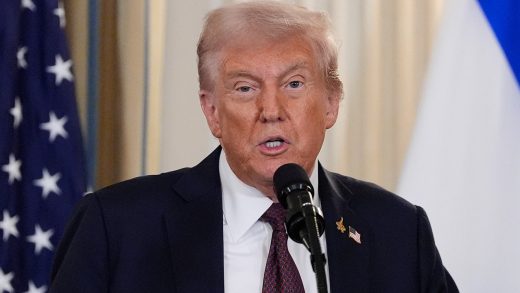Canada’s minister leading the stop-and-start trade negotiations with the United States says the situation is ultimately “resolvable,” but noted it will take some time to find a solution to the ever-evolving trade war.
Dominic LeBlanc told the Senate foreign affairs and international trade committee Thursday that his talks with the Trump administration are currently focused on lowering or removing sectoral tariffs on industries like autos and lumber, which he hopes to make progress on before next year’s scheduled review of the Canada-United States-Mexico agreement on free trade (CUSMA).
Although he expressed optimism that Canada is getting closer to both a resolution on those tariffs and a positive CUSMA review in July — thanks in part to the removal of reciprocal measures and pressure from American political and business leaders — LeBlanc said there are still difficult conversations ahead.
“I do believe this is resolvable, but in the definition of what resolvable means, I’m also very much of the view of the prime minister that the relationship with the United States has fundamentally changed, and it will not magically go back to what it may have been a year ago or 25 years ago,” he said.
“It would be, I think, an error to assume that some of the challenges that we’re working our way through now won’t remain in some form for some time.”
Canada was hit with more sectoral tariffs this week on lumber and furniture products, with more set to come later this month on heavy trucks and pharmaceutical products imported to the U.S.
Those are on top of punishing duties on steel, aluminum and other industries that U.S. President Donald Trump and his administration have justified under national security concerns.

Canadian exports to the U.S. that comply with CUSMA — about 85 per cent of cross-border trade — are not subject to the tariffs, which Ottawa says means Canada has a better deal with the U.S. than most other trading nations.
LeBlanc said he’s making the case in Washington that a “thriving” Canadian steel and aluminum industry can be a national security asset to the U.S., a premise the minister said is being acknowledged by his American counterparts.

Get daily National news
Get the day’s top news, political, economic, and current affairs headlines, delivered to your inbox once a day.
“There are a myriad of opportunities where I hope we can convince our American friends that diminishing the sectoral tariff pressures, recommitting to (CUSMA), and then focusing on those happy stories of economic and security collaboration that benefits Canada and the United States, and in many cases our Mexican partners — that feels like a more positive path to be on,” he said.
LeBlanc is set to testify to the House of Commons international trade committee later Thursday on the upcoming CUSMA review.
Canadians still reject Trump’s ’51st state’ talk
The testimony and preparation for a CUSMA review comes as Trump once again revived his rhetoric about making Canada the 51st U.S. state while speaking to a gathering of top U.S. generals.
Canadian politicians rejected those comments Wednesday.
New polling by Ipsos released Thursday found that, while most Canadians still say they would never vote to become part of the U.S., fears about Trump’s rhetoric jeopardizing Canada’s sovereignty have plummeted by 17 points since January.
Nearly three-quarters of Canadians surveyed said the “51st state” comments have boosted their Canadian pride, the poll found, and the share of Canadians who would entertain joining the U.S. if they gained full American citizenship has shrunk by nearly half, to just 16 per cent.
“I think part of it is (Canadians are) just getting used to the rhetoric, and it’s not as shocking as it was,” said Darrell Bricker, CEO of Ipsos Public Affairs.
“The second thing is, since most of Canadian exports have been protected under (CUSMA) and haven’t been affected by these new tariffs, they really haven’t seen much of an effect in their day-to-day lives…. If that changes, these numbers could also change.”

A previous Ipsos poll for Global News found the “Buy Canadian” movement sparked by Trump’s trade war also remains strong, with 56 per cent of respondents saying they bought Canadian products or investments in the last two weeks and nearly 60 per cent saying they went out of their way to avoid American products.
Trump’s ambassador to Canada, Pete Hoekstra, has criticized the “un-American” sentiment behind the “Buy Canadian” and “elbows up” approach promoted by Canadian politicians, which he says has gotten in the way of reaching a Canada-U.S. trade and security deal.
LeBlanc said American businesses and local governments are also upset by the tariffs on Canada and are making their voices heard publicly and privately, which could help to push the White House toward a deal.
He cited potential points of “collaboration” on “common interests” with the Americans that are being explored, though he declined to give details in public.
“We are confident that the domestic pressure from senators, governors, business leaders, union leaders in the United States will also create potentially an opportunity for us to come to an agreement with the American administration,” he said.
That answer came after a question on what “leverage” Canada still has with the removal of retaliatory tariffs on CUSMA-compliant products and the revocation of a digital services tax on U.S. platforms, a policy the Trump administration vehemently opposed and nearly scuttled the Canadian talks over.

LeBlanc said he is aware of the “commentary” suggesting Canada shouldn’t have retaliated with counter-tariffs in the first place, given the deals already reached with the European Union and countries like Japan and Britain that did not retaliate, and acknowledged he’s asked himself the same question.
“I think Canadians in public opinion wanted the government to respond” at the time, he said.
“But I do think the time has come now, as we look at reviewing CUSMA, to make sure that we’re not in a different position than our Mexican partners.”
The minister did assure the senators that Canada’s supply management system — another Trump grievance listed as a trade barrier by his administration — is not up for negotiation.
“If I think of discussions that are focused on strategic sectors under a lot of pressure now — steel, aluminum, automobile, softwood lumber — those discussions are not being put in jeopardy by the supply management system,” he said. “It comes up from time to time and our answer remains consistent.”
LeBlanc added he’s also “optimistic” that the issue of fentanyl trafficking that Trump has used to justify his initial tariffs on non-CUSMA-compliant Canadian goods “has been significantly reduced as a constant subject of discussion.”
“We still think (those tariffs) should be lifted,” he said.





